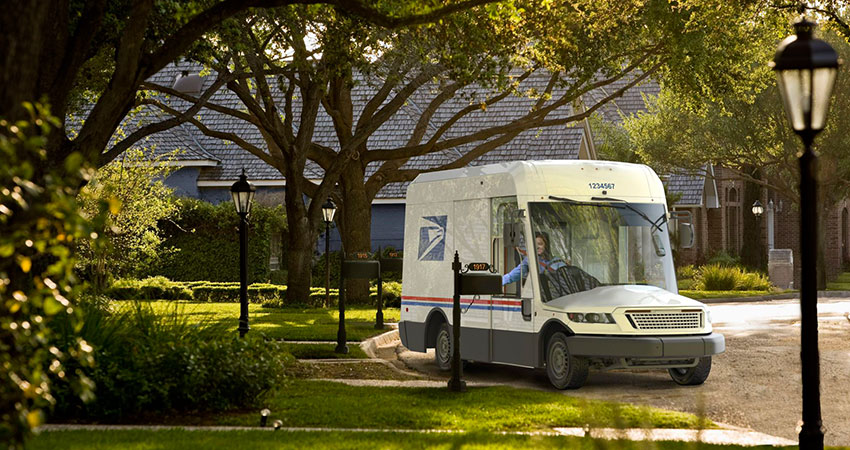The U.S. Postal Service announced a major upgrade to its planned rollout of electric vehicles to replace its aging delivery fleet, saying it will purchase only EVs after 2026, as the USPS bows to significant pressure from Washington and the states to expand and speed up its changeover.
For starters, the USPS will increase the quantity of so-called Next Generation Delivery Vehicles (NGDV) to a minimum of 60,000, of which at least 75% or 45,000 will be battery powered, by 2028. Thereafter, purchases will be 100% electric.
Between 2026 and 2028, the USPS plans to purchase an additional 21,000 EV delivery vehicles, opening it up to bidding from a mix of providers, with a preference for domestic firms. The initial batch of 60,000 will all come from defense contractor Oshkosh. All new vehicles will have air conditioning and advanced safety features, the USPS said; UPS drivers went public this summer with war stories of “brutal heat” in their vehicles causing sickness and even death.
In total, 66,000 of the 106,000 delivery vehicles purchased to replace the fleet, or 62.3%, will be EVs. The initial commitment from the USPS was for 20% of new vehicles to be electric. Much of the current USPS fleet of 217,000 Grumman delivery vehicles is more than 30 years old.
President Biden and Democratic members of Congress turned up the heat on Postmaster General Louis DeJoy when the previous plan was announced, funded in part by $3 billion from the 2022 Inflation Reduction Act. An additional $6.6 billion will now be allocated for USPS delivery vehicle purchase between now and 2028.
The $3 billion will also help fund an infrastructure that includes tens of thousands of charging stations to power the new USPS EV fleet.
“While most of the electric vehicle funding will continue to come from Postal Service revenues, we are grateful for the confidence that Congress and the Administration have placed in us to build and acquire what has the potential to become the largest electric vehicle fleet in the nation,” DeJoy said in a media event today announcing the revised plan.
He added the ramped-up electrification plan will be enabled by an ongoing network modernization initiative, which will reduce carbon emissions in other ways. These include reduction of inefficient transportation and improvements to distribution operations, resulting in far fewer air cargo flights and truck trips.
In June, the USPS said it planned to update its environmental impact statement related to the mix of electric vs. gas-powered vehicles. DeJoy and the USPS said the move was driven by its delivery network improvement plan and unrelated to lawsuits from attorneys general favoring an all-electric fleet.
“We have a statutory requirement to deliver mail and packages to 163 million addresses six days per week and to cover our costs in doing so — that is our mission,” DeJoy said. “As I have said in the past, if we can achieve those objectives in a more environmentally responsible way, we will do so.”

